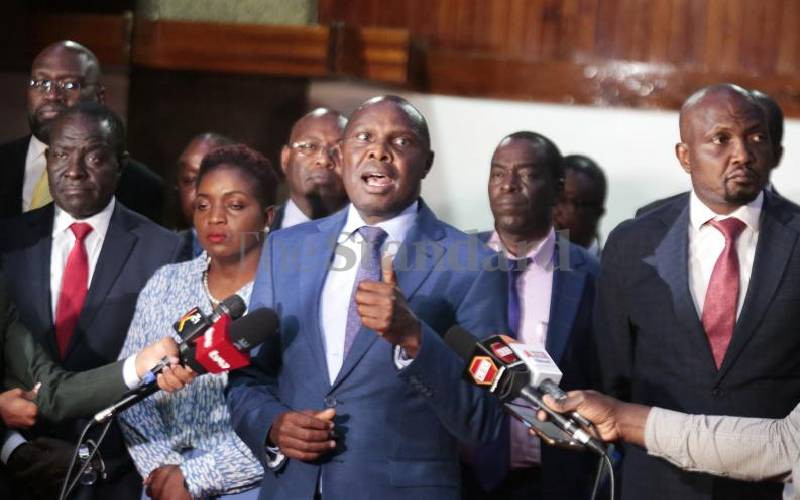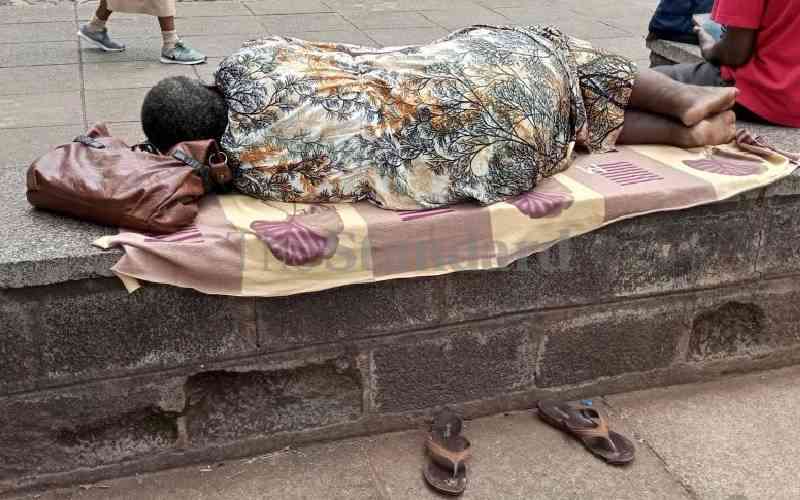KMPDU Secretary General Davji Attellah (3rd right) and deputy secretary general Dennis Maskellah (right) singing solidarity songs with doctors, medical interns and medical students at the Mega Doctors assembly after a press briefing on the ongoing doctors’ strike on 2nd April 2024[David Gichuru, Standard]
Employment and Labour Relations Court (ELRC) on Wednesday gave doctors, Ministry of Health and counties one last chance to settle the stalemate within 14 days.
Justice Byrum Ongaya said that his order suspending the doctors strike was in place but on condition that the parties commit to meet within two weeks and come up with a solution.
He declared that if the deadlock persists, he will hear rival arguments to determine whether the strike is legal or not.
This came as the strike issue became the mythical Tower of Babel with all parties speaking different tongues on who is to blame.

- State adamant as Raila weighs in on health crisis
-
Deserted KNH turns into centre for few helpless critical patients

-
Deserted KNH turns into centre for few helpless critical patients

-
Medics insist 11 demands must be met before calling off strike

Kenya Medical Practitioners and Dentist Union (KMPDU) filed an application to punish county governments and the Ministry of Health for allegedly boycotting and storming out of the ‘whole nation’ meetings.
The meetings were to discuss the bare minimums for the parties to engage. The union also accused the Susan Nakhumicha-led Health Ministry of playing underhand games, including call for last minute meetings.
On the other, the Ministry of Health and counties pointed an accusing finger at KMPDU claiming that despite Justice Ongaya ordering them back to work, they have remained defiant.
The Attorney General who is representing the ministry told the court that there should be at least 75 per cent doctors in hospitals as a bare minimum requirement for medics to be on strike.
The AG pegged his argument on the Labour court’s judgment in 2022 that outlawed doctors and nurses strike unless there is a specified minimum number of medics who are attending to patients.
A three-judge bench of the Labour court ruled that the law governing essential services in the country allows public employers to determine the classification of employees who must continue to work during a work stoppage.
They found that the government has the right to dictate the number and names of employees within each classification and the essential services that are to be maintained.
Justices Monica Mbaru, Jorum Abuodha and Linnet Ndolo directed former Health Cabinet Secretary Mutahi Kagwe and his Labour counterpart Simon Chelugui to come up with regulations within 12 months to ensure that hospitals have personnel during strikes.
“Industrial action by health workers is not permitted unless there is a known and acceptable formula of ‘minimum service’ retention at every affected health facility. This limitation is in addition to those imposed by the conciliation procedures set by the Labour Relations Act,” the court ruled.
Doctors argue that first, the ministry and counties should disclose how many medics they have as some services have no one to handle.
Among KMPDU's demands is to ensure there are enough doctors employed in order to make the bare minimum requirement a reality.
Justice Ongaya heard that although one doctor ought to take care of 1,000 patients, the current situation is that one doctor takes care of 11,000 Kenyans.
The union has challenged the government and counties to soften their stance if they want a compromise. In its submissions filed before court, KMPDU lamented that the members were being underpaid.
According to its comparative study, the union claims the problem lies at President William Ruto’s doorstep, the State House where there is one doctor tasked with taking care of those at the presidency.
KMPDU claimed that State House paid the doctor less than Sh 863,240 in the Financial Year 2021-2022. Yet in the Collective Bargaining Agreement, the doctor ought to have been paid Sh2.1 million but it was claimed that he got Sh1.3 million.
The 1,848 doctors under the ministry were said to have been paid Sh27 million less the agreed amount for the same financial year.
The union said that there is no uniformity in how its members are paid citing the case where a doctor attached to the Directorate of Criminal Investigations (DCI) was being paid more than the agreed amount in the CBA.
KMPDU has demanded that the government apprehends the police officer who fired a teargas canister at the secretary general Davji Atellah.
The doctors have also demanded refund of the controversial housing levy deducted from their pay.
With all parties claiming to have complied with the court order, and accusing the other of disobedience, Justice Ongaya had to ask them to at least act in a civil manner.
In court, there was a third voice. The conciliator was tasked to look at what the issues were and at least bring the two warring parties together to make a resolution.
The conciliator, Kisurulia Kuloba, observed that it was important to end the current strained industrial relations in the health sector. His report is dated March 6, 2024.
“The country can no longer afford to have strained industrial relations in this critical sector owing to underlying unresolved grievances by the parties,” he said.
In his report, Kuloba singled out six issues that he deemed to be at the heart of the perennial strikes.
He said that CBA negotiations, comprehensive medical cover, employment of more personnel, provision of adequate protective gear, call allowance and post graduate training and promotion were the main grievances.
"It is high time these issues were resolved once and for all to bring about industrial piece and harmony in the critical sector,” advised Kuloba.
On the implementation of the 2017- 2021 CBA, the conciliator observed that there were 48 agreements, and the government and counties were ordered to action all terms and report to the court within 60 days.
CBA negotiations were to start for the 2021-2025 period but the employers had not given a counter after KMPDU gave its proposal.
During the meetings, Kuloba noted that doctors raised concern that there were salary delays in some counties. Mombasa and Kisii were called out as being notorious.
Kuloba said that the issue needed to be sorted out once and for all.
On statutory deductions, the conciliator's report states that the union did not specify which counties were not remitting the same.
He also said that although all doctors in the two levels of government were supposed to have comprehensive medical cover, it was unclear how many counties were not complying.
Employment of all doctors was another thorny issue. Kuloba said that this was not provided in the CBA. He argued that each county and the ministry are responsible for recruitment on the need basis.
On protective gear, the conciliator said there was a healthcare worker safety policy by the ministry which counties are expected to implement but there was no clarity which devolved units did not have the gear.
The conciliator found that creation of centralised management of human resources (health services commission) was not in the CBA and therefore needed amendment in the Constitution.
Call allowance was yet another issue. Kuloba stated that doctors working in universities are employees of the respective institutions and the issue should be dealt with there.
He stated that conciliation proceedings indicated that the current CBA was based on salary or grading structure that had not been approved by the Public Service Commission. However, the counties and the ministry implemented the CBA according to the Public Service Commission structure.
The conciliator recommended that counties should come up with modalities of ensuring salaries are paid on time and remit statutory deductions.
Kuloba was of the view that the challenges on the implementation of the CBA were likely to be a thorny affair unless harmonised. By Kamau Muthoni , The Standard






